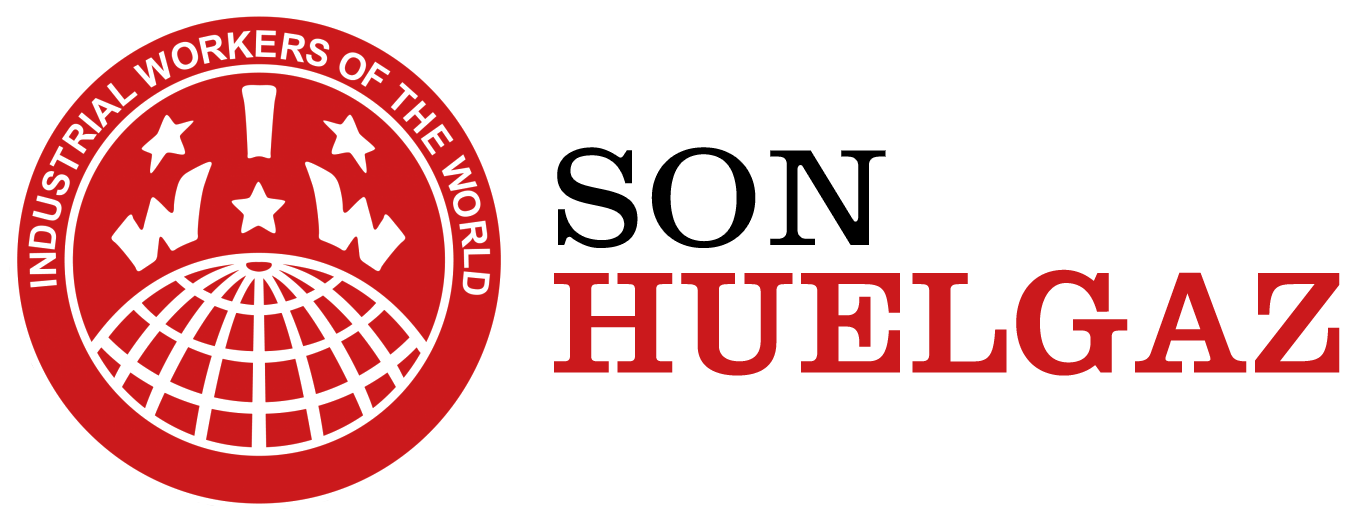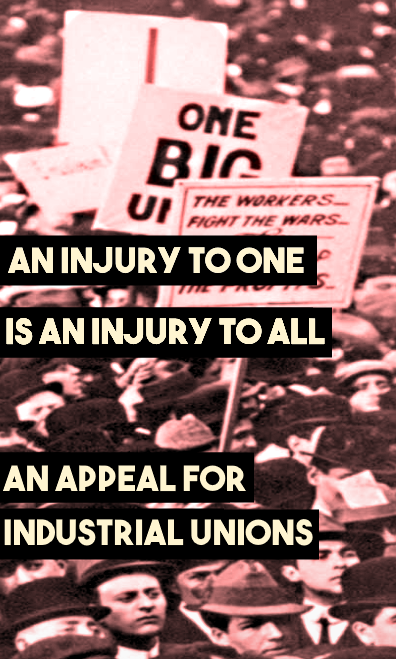Below are edited versions of two different IWW pamphlets. The first is a short overview of the IWW’s view of the best type of unionism, what we call “Revolutionary Industrial Unionism”. The second is a pamphlet outlining what a union is and why all workers need to join and build unions for their defense.
An Appeal for Industrial Unions
By: Mel A. – Phoenix IWW
Work is Work: you spend your days breaking your back, getting yelled at by bosses and customers alike, making scraps for your trouble while the CEO and management rake in millions. Does work have to be this way? We believe that work can be changed for the better, and average workers can improve their conditions at work with a Union.
What is Industrial Unionism?
Though many unions exist around the world today, in the United States and many other countries, trade unions are almost universally isolated to specific “bargaining units”, which limits their reach and influence to ONLY a certain set of employees. Revolutionary Industrial Unionism, as expounded by the IWW, is the concept that a union, rather than being limited to a particular job title such as “nurses” or “teachers” or a single business such as a grocery store, an industrial union should, instead, extend to as many sets of workers as possible. In the case of a hospital, the union should include all workers in that hospital, regardless job title, and in the case of business such as grocery stores, the union should include contracted employees who work for a different business, such as cleaners, and encompass the entire food production industry, from farm workers, to processors, to terminal workers, to truckers, and finally to retail employees. For another example, instead of a single union for each construction craft, such as electricians, carpenters, plumbers, etc., the IWW advocates One Big Union for all workers in the construction industry, a united construction workers union that can coordinate much more effectively and exert far more pressure on the contractors than any single craft union would be able to.
These more powerful Industrial Unions do exist. Many of them were built in the 1930’s, aligned with the CIO and (partially) modeled on the IWW’s structure. However, a key ingredient that these new unions typically lacked was rank-and-file democracy. The CIO unions of the 1930s did not follow the IWW’s insistence on democratic, worker control of the union. The new union leaders did not intend to implement what is commonly called Rank-and-File Democracy.
Rank-and-File Democracy
A fundamental tenet of the IWW’s Revolutionary Industrial Unionism is that unions should be organized by the workers themselves, and that each worker should have a say in how their union operates. Rather than having a permanent bureaucracy of union officials, the union should be run by the workers themselves, elected to specified and limited terms and immediately recallable. Union officers should come from the rank-and-file and serve the membership with an exclusive mandate to implement what the workers of that union voted on. Power, rather than coming from lawyers, lobbyists, and paid staff, in others words from the top-down, would instead come from the bottom-up. Power should emanate from the shopfloor of the workplace to the Industrial Union as a whole.
Beyond the Local Level
When the Industrial Union grows beyond a single industry, or nation-state, as in the IWW’s vision of One Big Union world-wide, it can be organized as a federation of Industrial Unions. This means that while each Union has autonomy over its own industry, they can coordinate on a much larger scale than before, whether that be from a local, regional, or “national” level. This federation of unions is also organized in a democratic manner, with each union being able to vote and put forward matters through their elected delegates. This ensures unions from the smallest to the largest can make their voices heard and act in a way that benefits workers over a vast territory.
Revolutionary Industrial Unionism
The failure of capitalism and the “business unions” to establish an adequate standard of living for the working class means that we need a different way forward. Industrial Unionism provides us with a tool to correct these failures and ensure that resources flow into our pockets instead of the pockets of the bosses. All of us deserve more than the scraps we get from the bosses. We need Revolutionary Industrial Unionism more urgently than ever.
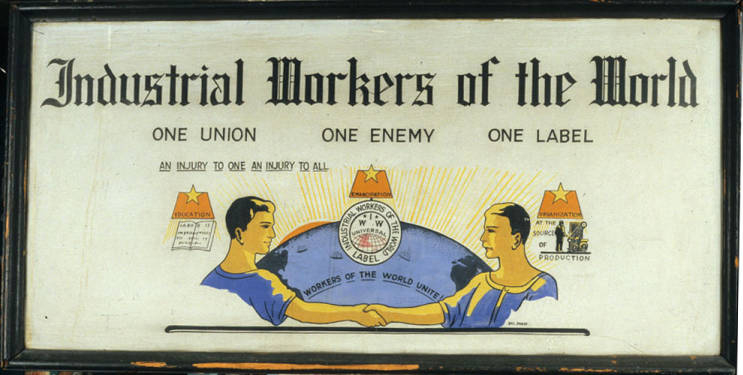
What is a Union?
by the San Francisco Bay Area Branch of the IWW (1998).
Part 1 – The Conflict between you and your Boss
Bosses can do whatever they want when there’s no Union. And that means anything. They can cut your pay, they can fire you. There are no limits to their power and control over your working life, because, one on one, nobody is a match for the boss. How can you win an argument with somebody who can fire you?
Workers found out a long time ago that they didn’t have power at work as individuals. But if they worked together as a united group, they could win some control over their working lives and gain their own voice in workplace decisions. And that’s what a union is: An organization of everybody who works for a boss, using their collective strength to:
- Stop the boss from doing what the workers don’t want – like firing employees without just cause, awarding jobs or higher wages based on favoritism or discrimination, or treating the workers unfairly and with disrespect.
- Make the boss do what the workers want – like paying better wages, providing health care and paid time off, and treating workers with human dignity.
Why is there a conflict between management and workers?
It’s important to understand why this conflict exists in the first place. It doesn’t arise because the bosses are evil and we are good. Somebody goes into business, buys machinery and raw materials and then needs one additional thing to make money: Workers like you!
And that means unemployed workers, because they’re people who need a job badly enough to come to work for whatever the boss wants to pay. A large pool of unemployed workers has always served the bosses’ purposes. There have always been millions of unemployed people. The fact is that your wages and the boss’ profits come out of the same pot of money. Therefore, the smaller your paycheck gets, the bigger the boss’ paycheck is.
Typically, the bosses and their top managers receive hundreds of thousands of dollars in annual salaries and fringe benefits. Bosses make a budget to decide how to spend the company’s money for the year. The bosses try to spend this pot of money the way they want. Because they get to keep all the leftover money after some is spent on materials, expanding the business, and paying the workers, the bosses try to pay you the lowest wage you will tolerate.
Before there were unions, all bosses did whatever they wanted. If they wanted more money for themselves, they took it. When workers started to organize into unions, union members discovered that they had the power to demand a bigger share of the budget – working people, acting collectively, could raise the price of their time and labor. That’s why bosses don’t like it when workers organize into unions, it cuts into “their” share of this pot of money.

Part 2 – Union Contracts
This IWW pamphlet was written and published before the IWW’s extensive discussion of “non-contractual” and “alternative forms” of union organizing. Therefore, some of the information below doesn’t conform to the IWW’s emphasis on “Solidarity Unionism” while other sections were substantially re-written. Nevertheless, it is still useful or applicable to those workers who do have a traditional union contract, whether it be with the IWW or another trade union.
After you and your fellow workers decide to organize into a union, the IWW will help you build the shopfloor solidarity you’ll need to force the boss to do what you want and stop doing what you don’t want.
A common tool unions have used to secure the gains workers have won through struggle is by negotiating a temporary truce with the boss. This temporary “peace treaty” is usually put in writing, and is called a collective bargaining agreement, or a union contract.
If you get hired at a job with a union contract, management might explain (in an orientation video) what a great wage you will make and what generous benefits you’ll receive. But soon you’ll discover that – lo and behold! – all the things the bosses say they’re giving you out-of-the-goodness-of-their-hearts are written in the union contract. Rarely does anybody get a dime more.
These things are not gifts. A union contract represents what the workers have forced management to do or not do: gains made through the collective power of the workers on the shop floor – through action. It’s the result and the record of struggles and sacrifices by past and current workers to get what they want.
A union contract is very different from a contract to buy a car or a house. If contracts like that are violated, you have to go to court to get a judge to enforce them. But your union contract is enforced by you! If you don’t enforce your contract, the bosses will simply violate the contract, to do whatever they want, and the contract won’t be worth the paper it’s printed on (if you ever seen it in print).
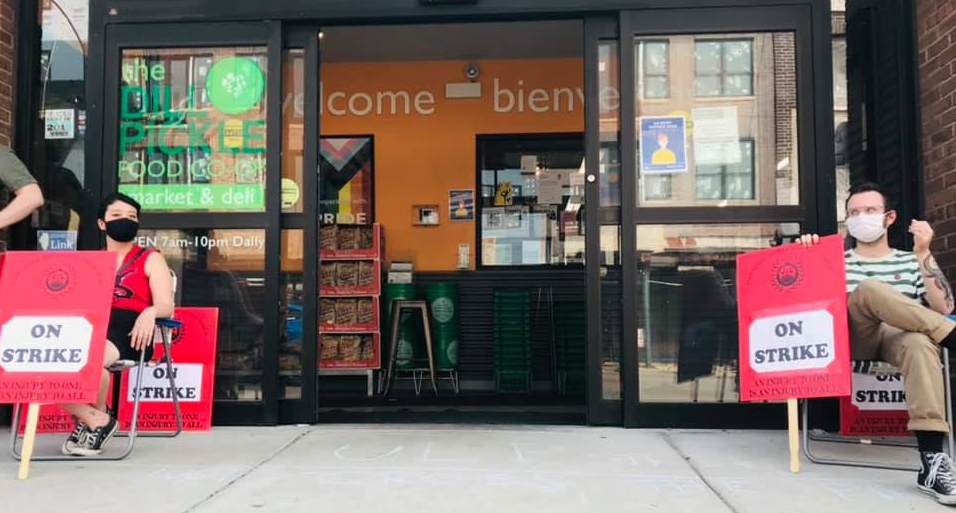
Union contracts are enforced by workers on the job. The way to accomplish this is with holding meetings of members and workers from the shop; discussing what needs to get fixed and making a plan involving ‘escalating’ actions; then executing this series of actions where workers confront the bosses and demonstrate the collective resolve. These membership meetings are democratic; they should happen on a regular basis such as weekly or monthly and involve voting on everything from who takes on which tasks to what actions you will take. These meetings help to unify your workplace organization and present all the voices of the workers as one.
In a workplace that has a typical business union contract, the enforcement mechanism for the contract is the grievance procedure. “Shop stewards” or “building reps” are members that are typically tasked with helping workers file grievances when the boss violates the contract. Depending on your union and your steward, this process can be effective and empowering or just a theatrical exercise to get you to give up. Chances are the grievance process is somewhere in between – it is supposed to work but its slow and ineffective at solving the problem. If you have a less-than-effective grievance procedure at your workplace, one idea the IWW typically recommends is to create “collective” grievances, where not just one worker, but many workers create and sign onto a grievance that represents as large a group as possible. Then, as a group, you use this “collective” grievance as an urgent issue that needs to get solved immediately.
Sometimes bosses might tell you that they cannot give you what you want because the union contract doesn’t allow it. Don’t ever believe it–not even for a second. The contract guarantees minimum wages, benefits, rights and conditions, and doesn’t ever prevent the boss from giving you more.
And don’t forget – A Union is a group of workers organized to fight for themselves. You will encounter many different people talk about the union as “they” and “them” – as something separate from the workers. You will here the boss, your co-workers, and even some union people make the union sound like a “third party”. The IWW recommends speaking of the Union as “we” and “us”, especially during an initial union campaign, so as to emphasize who should be in charge of the organization. To be sure, when the bosses are attacking the union as “they” and “them”, what’s really meant is YOU!
Remember, the members are the union. The members as a whole own the contract. Collectively, the members should decide what to do about a problem. You and your co-workers should work to convince your shop stewards and other union officers to carry out the membership’s wishes on workplace issue, rather than let officers convince you to do nothing.
When you do see a problem, bring it to the attention of your shop steward or other union officers immediately, right that minute or that same day. For one thing your contract may have time limits for filing grievances, but also, its critical to add urgency to a complaint so that the bosses see that this is not something they can just ignore.
If you are building an IWW union at your workplace, it’s essential that you and all your co-workers attend meetings, give your opinion, write about your experiences, vote on all proposals, and take ownership of building the union. Participation is key. An active union is a strong union.
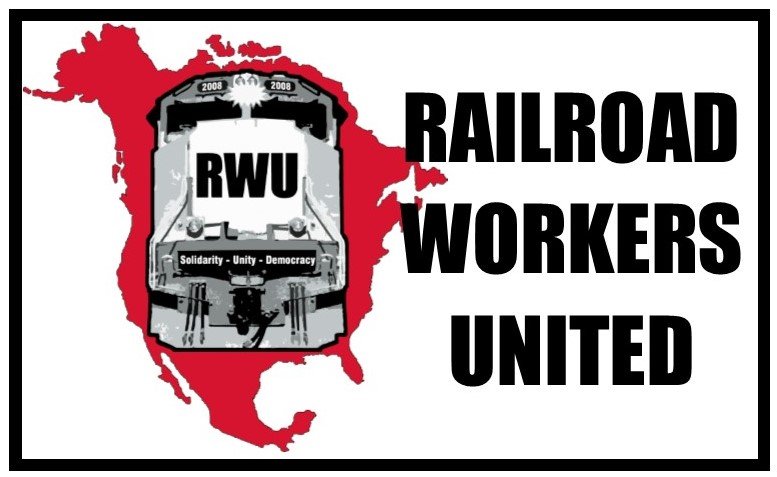
However, if you are a Wobbly at a workplace that already has a trade union contract, participation in your business union might a little more tricky. Often business unions don’t want you to get involved, don’t want to be asked tough questions, and don’t want you to rock the boat. You might have a lot of ideas and solutions, and perhaps your sleepy union would rather “call it a day” instead of fight the bosses. In this scenario, you will need to strategize and come up with the best way of approaching your business union. It could be that all that’s needed is just some genuine enthusiasm and energy – some ‘leading by example’. But its also possible that your enthusiasm will be met with hostility. In this latter case, you will need to prepare to fight your union bureaucracy with equal energy to fighting your boss.
Part 3 – Investing in a Strong Union Movement
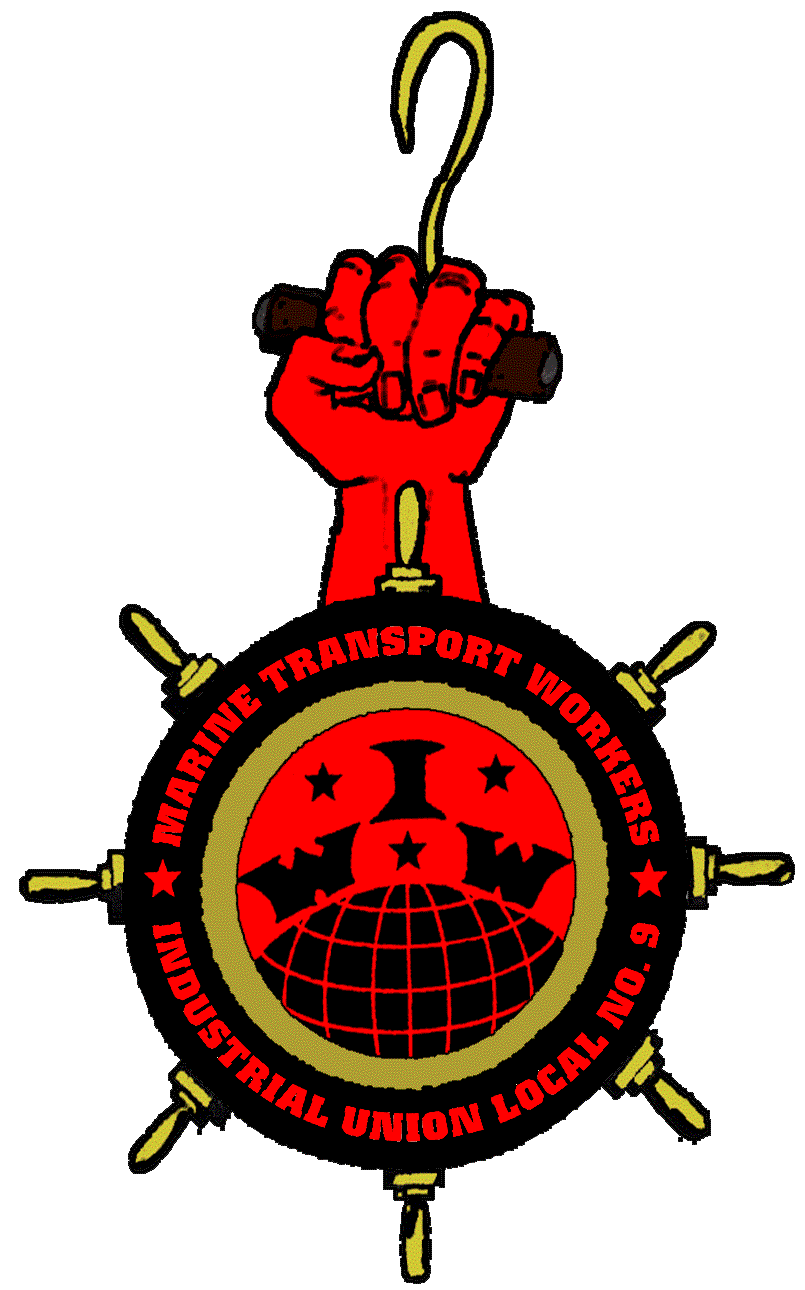
The business owners are well organized—so well organized that they almost act like One Big Boss! We can only succeed in stopping them from doing what they want to do to us by organizing the overwhelming majority of workers. This monumental task will require not only our whole union’s support, but also the personal involvement of individual union members. We make this commitment in the understanding that there is no better investment we can make in our future and that of the generations who’ll come after us.
A higher number of unionized workers promotes a better standard of living for all working people, organized or unorganized. In the U.S., there has historically been a lower level of workforce unionization than in other industrialized regions. Countries with higher levels of unionization have better social benefits than we do here, such as free health care and free higher education, a shorter work week, etc. Because this reality, we have got to organize!
Pay your Dues
You might have heard that when you organize a union in your workplace, you’re required to pay an initiation fee and monthly dues – to join the union and remain a member in good standing. That’s true. Here’s how it works in the IWW:
The IWW initiation fee is equal to one month’s dues. It’s a one-time fee you pay to defray the administrative costs of signing up. The IWW constitution forbids unaffordable initiation fees and dues, because we believe the union should be accessible to all workers regardless of income, skill level, or whether you’re working or not.
The IWW’s basic dues formula is set by the membership in a union-wide vote. It’s based on your monthly income. The dues rate for the IWW, as of 2022, is as follows:
- Minimum Dues = $11.00 (US) per month – if you make less than $2,000.00 (US) per month;
- Regular Dues = $22.00 (US) per month – if you make between $2,000.00-$3,500.00 (US) per month;
- Maximum Dues = $33.00 (US) per month – if you make more than $3,500.00 (US) per month.
For individual IWW members who live in a region outside of an IWW administrative body, the dues rate is typically set at 1% of your monthly income.
If you are organized into a local Branch, half your dues goes to General Headquarters in Chicago and the other half stays with your local Branch. (40% goes to GHQ and 60% stays local.) But your basic dues won’t be enough to cover all the expenses your workplace committee will have to deal with. You and your fellow workers will have to build wisely and steadily. Two things that every local IWW body should save money for are a local Organizing Fund – to bring more workers into the IWW family, and a local Strike Fund – to plan ahead for the next fight.
Dues Collection
Most other unions have a “dues checkoff”, a system where the employer withholds your dues from your paycheck and then writes a check to the union covering everybody’s dues. The IWW, however, doesn’t believe in this kind of dues collection system. In fact, the IWW constitution forbids us from using a dues collection system where the employer acts as a middleman between the members and the Union.
Members can choose to have their dues deducted automatically from their bank account, can pay online themselves, or can pay to local officers called “delegates” who are responsible for membership outreach and organizing.
The key to funding our fighting organization is that we want as much control as possible to rest with the members, which frees our Union from being controlled by bosses and bureaucrats.
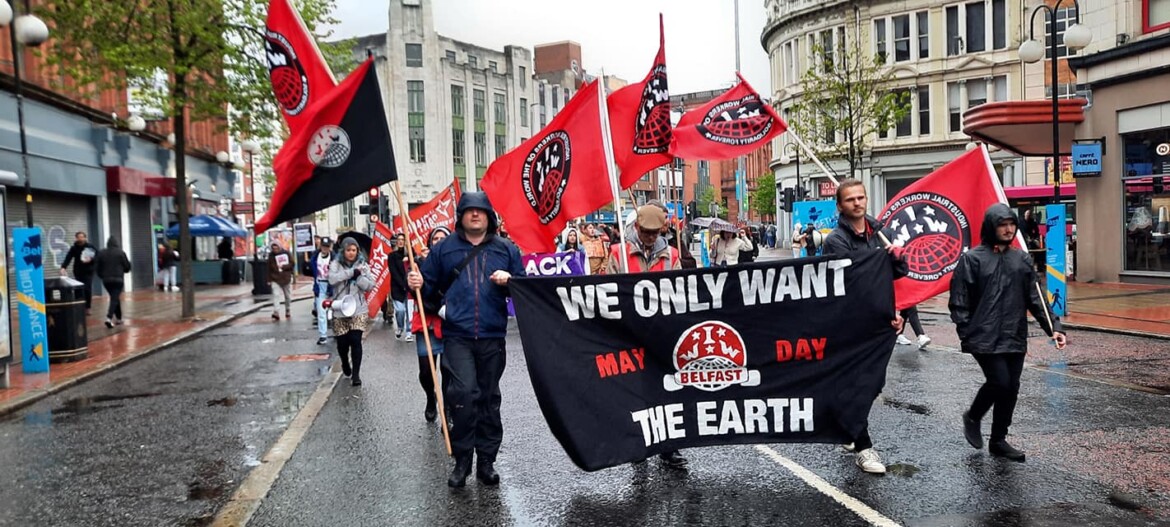
Part 4 – Divide and Conquer: The Employer’s Favorite Tactic
A union is different from any other organization. If you organize a social club or a sports team, you get to choose who belongs to it. Not so with the union. It’s an organization of everybody who works for a boss. The Union uses its collective power to stop the boss from doing what we don’t want and make the boss do what we want. Normally, we don’t have a choice who the boss hires, so we must organize everybody. That means we must convince each worker, including new hires, of the importance and necessity of our union.
Employers are a very tiny part of the population, but they exercise a great deal of influence. That’s the way they’d like to keep it. But working people represent the vast majority of the population. To undermine the great potential for power we have as workers, the bosses use many wedges to keep the working class divided against itself, including:
- Racism, bigotry against People of Color, ethnic groups, immigrants, etc.;
- Sexism, discrimination based on gender;
- Homophobia, Trans-phobia, etc. – discrimination based on sexual orientation, gender expression, etc.;
- Skill Divisions – a form of discrimination pitting white collar workers against blue collar workers; technical workers against service workers against clerical workers against laborers; and
- “Redbaiting” – a clever trick the bosses use to pit workers against their colleagues who espouse working-class unity and militancy
And the list goes on…
The bosses practice this divisive manipulation both subtly and blatantly. Employers use attacks on immigrant workers, ballot initiatives against affirmative action, fear of workers who have been to prison, media campaigns against low income families, blaming job losses on environmental protection, and other propaganda to deceive us. Keeping working people fighting among ourselves – that’s how they maintain their control over us! That’s the only way that they can keep their stolen wealth.

We fight this bigotry and division in two ways. First, we support movements that struggle against discrimination or prejudice of any kind. We fight for a new society in which all will be equal, as sisters and brothers. And second, we have a simple standard: All workers have the absolute right to be judged solely on their relations to fellow workers and their conduct as a union member – regardless of what they look like, regardless of where they come from, regardless of what language they speak, regardless of anything. We believe an injury to one worker is an injury to all workers.
The power of the union comes from bringing together everybody the boss hired (and even some they didn’t). It must be a democratic organization with room for everybody. We believe: Whatever divides us is bad, whatever unites us is good.
In Unity There is Power!
The power of the union comes from what you put into it, not what you take out of it. The bosses are increasingly taking back more and more of the gains we’ve won over generations of struggle and sacrifice. The government is more than happy to assist the employing class in their drive to take away our security. It takes a lot of unity to win our battles against the business class, and we can expect more battles for as long as workers want to have a say in their wages, benefits, rights, and working conditions.
You are invited to join the IWW and fight with us for a better way of life for all the world’s workers.

